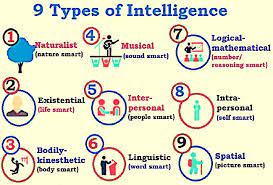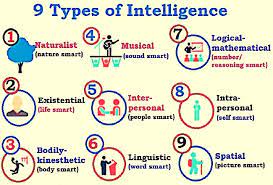Understanding the various types of intelligence is crucial in recognizing the diverse ways in which intelligence can be expressed.
For most people, often at a tender age, it is common to equate the concept of intelligence with having good grades in school. That kid who has the poorest result na mumu while those topping their class are intelligent. Your elders made you believe so.
You can’t blame them, though. Most went through the same brainwashing, too, and sadly crossed forty before enlightenment came.
I’m sure you know what they say about fools at forty.
But you are probably a different story. Perhaps, in time, common sense paid you a visit and made you realize that intelligence is not a single concept, but rather a collection of abilities and skills that are expressed in different ways. Which means that mumu in your class could have one type of intelligence that you knew nothing about.
Intelligence is a complex and multifaceted concept that has been studied for centuries. I can tell you there are different types of intelligence, each of which encompasses unique abilities and skills.
In this article, we will explore the concept of intelligence, the different types of intelligence and what they entail. We will also look at some Hall-of-Fame characters in the field of intelligence.
READ ALSO: Free Websites To Watch Cartoons Online
What Intelligence Means
Intelligence basically refers to the ability to learn, reason, solve problems, and adapt to new situations. It encompasses a range of cognitive abilities, including memory, perception, attention, language, and reasoning.
While we often measure intelligence through standardized tests, such as IQ tests, there is no single agreed-upon definition of intelligence. Some researchers argue that intelligence is a single general cognitive ability, while others believe it comprises multiple abilities, such as verbal comprehension, perceptual speed, and reasoning.
A variety of factors influence intelligence, including genetics, environment, education, and culture. Research shows that individuals from certain cultures may perform better on specific types of intelligence tests due to differences in language, education, or social norms.
Moreover, intelligence is not a fixed trait and can change over time. Through education, training, and practice, individuals can improve their cognitive abilities and increase their intelligence.
Intelligence Hall of Fame
- Albert Einstein: The German-born physicist is one of the most influential scientists of the 20th century. His theories of relativity revolutionized the way we understand space, time, and gravity.
- Leonardo da Vinci: An Italian artist, scientist, and inventor who is widely regarded as one of the most brilliant minds in history. He was a master of multiple disciplines, including painting, sculpture, architecture, mathematics, and engineering.
- Isaac Newton: An English physicist and mathematician who is widely considered to be one of the most influential scientists in history. His laws of motion and theory of gravity laid the groundwork for modern physics.
- Ada Lovelace: Who, you asked? Well, I wondered, too. However, hear me out. She was an English mathematician and writer who is often credited with being the first computer programmer. She wrote the first algorithm intended to be processed by a machine, and her work laid the foundation for modern computer programming.
- Aristotle: A Greek philosopher and scientist who made significant contributions to fields such as metaphysics, ethics, politics, and biology. His work had a profound influence on Western thought and culture.
- Galileo Galilei: An Italian physicist, mathematician, and astronomer he was. He is famous because he played a pivotal role in the Scientific Revolution of the 17th century. His work on the laws of motion and the telescope revolutionized our understanding of the universe. Do some research.
So, these individuals are just a few examples of historical figures known for their intelligence. However, there are countless others who have made significant contributions to the fields of science, mathematics, philosophy, and art throughout history. I could go on and on, but I have not the time.
Moving on.
SEE: The Bro Code: Brotherhood At Its Peak
The 9 Types of Intelligence

Linguistic Intelligence
Linguistic intelligence refers to the ability to use language effectively. People with high linguistic intelligence are good at expressing themselves both verbally and in writing. They have a strong command of language and are able to use it to persuade, explain, or entertain others.
Linguistic intelligence is essential in professions such as writing, journalism, and public speaking.
READ: 8 Steps To Improve Your Communication
Logical-Mathematical Intelligence
Logical-mathematical intelligence is the ability to reason, solve problems, and think abstractly. People with high logical-mathematical intelligence are able to understand complex systems and patterns, and they can use logical reasoning to solve complex problems.
This type of intelligence is crucial in fields such as mathematics, science, engineering, and computer programming.
Spatial Intelligence
Spatial intelligence refers to the ability to perceive and manipulate visual images in one’s mind. People with high spatial intelligence have excellent spatial reasoning skills and are able to visualize objects in 3D space.
They are often skilled at activities such as drawing, architecture, and engineering.
Bodily-Kinesthetic Intelligence
Bodily-kinesthetic intelligence is the ability to control one’s body movements and handle objects skillfully. People with high bodily-kinesthetic intelligence are often athletes (Hello, Usain!), dancers, or skilled craftsmen. They have excellent coordination and are able to learn physical skills quickly.
Related: How To Build Social Skills
Musical Intelligence
Musical intelligence refers to the ability to understand and create music. People with high musical intelligence have a keen sense of pitch, rhythm, and melody. They are often skilled at playing instruments or composing music.
Interpersonal Intelligence
Interpersonal intelligence is the ability to understand and communicate effectively with other people. People with high interpersonal intelligence are empathetic and are able to relate well to others. They are often skilled in professions such as counseling, teaching, or social work.
SEE: How To Build Professional Development
Intrapersonal Intelligence
Intrapersonal intelligence refers to the ability to understand one’s own emotions, motivations, and thoughts. People with high intrapersonal intelligence are self-aware and are able to reflect on their own feelings and behaviors.
This type of intelligence is crucial in professions such as therapy, coaching, or counseling.
READ: Things You Must Master To Be Successful In Life
Naturalist Intelligence
Naturalist intelligence is the ability to observe and understand the natural world. People with high naturalist intelligence are often skilled at activities such as gardening, farming, or animal care. They have a deep appreciation for nature and are able to recognize patterns and systems within the natural world.
Existential Intelligence
Existential intelligence is a relatively recent concept in the field of psychology and refers to the ability to contemplate and understand complex philosophical and existential questions related to the meaning and purpose of life. It involves the capacity to think deeply about the nature of existence, the human condition, and the relationship between oneself and the universe.
Individuals with high levels of existential intelligence often possess a keen awareness of their own mortality and the fleeting nature of life. They may be highly reflective and introspective, contemplating the deeper mysteries of existence and questioning the nature of reality.
Moreover, individuals with high levels of existential intelligence may also possess a heightened sense of empathy and compassion.
ALSO READ: Yahoo Yahoo In Nigeria
A Final Word From BattaBox
In conclusion, intelligence is not a single concept, but rather a collection of abilities and skills that are expressed in different ways. By understanding the various types of intelligence, we can appreciate the unique talents of different individuals and recognize the diverse ways in which intelligence can be expressed.
If you have any questions after reading this, you possess none of the options listed above.





